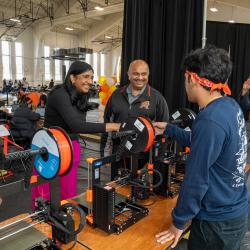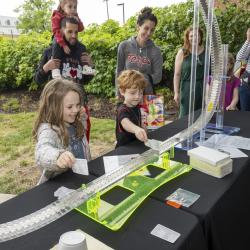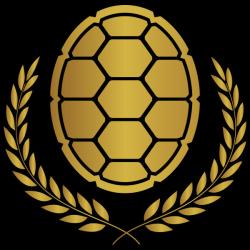Career Q&A with Graduating Senior Faith Cosgrove
Cosgrove sought Career Center support for graduate school applications.

Why did you decide to study biological sciences at UMD and what inspired you to pursue graduate studies in genetic counseling?
I always had a fascination with biology growing up, so when I came to UMD I was eager to learn more about this exciting field and expand my knowledge of introductory biological principles. Since I was especially interested in studying disease, I entered my freshman year of college with a microbiology concentration and a goal of becoming an epidemiologist.
After taking my first genetics course, BSCI222: Principles of Genetics, this plan quickly veered off track. I was captivated by the course and found myself gushing to friends and family about the content I had just learned. I switched my major concentration to cell biology and molecular genetics and sought careers that would allow me to cultivate my passion for this field and soon stumbled across genetic counseling, which helps people understand how genetic illnesses can affect them and their families.
It was not until landing an internship working with a team of genetic counselors at the National Institutes of Health, where I was exposed to the impacts genetic counselors can have on patients’ lives, that I became truly confident this career was right for me. Since then, my desire to become a genetic counselor has only grown stronger, and I am ecstatic to pursue my Master's in Genetic Counseling Training this fall at the University of Maryland School of Medicine!
How have you taken advantage of opportunities on campus to pursue your career goals?
I am involved in the Pre-Genetic Counseling Society, where I serve as secretary. This club has been instrumental in shaping my career in genetic counseling, providing the opportunity for me to meet with genetic counselors and learn more about what it takes to succeed in this field. Additionally, by participating in mental health awareness clubs on campus and learning effective strategies to counsel others, I have gained experience offering support to those going through difficult times, which is essential to a career as a genetic counselor.
Outside of these clubs, I have taken advantage of both the Writing Center and University Career Center to gain professional feedback on resumes, personal statements and mock interviews. These experiences have been invaluable in providing me with direction on navigating career-related struggles and points of confusion.
What kind of career guidance and one-on-one feedback did you receive from the University Career Center @ CMNS?
I went to the University Career Center @ CMNS in search of guidance in writing personal statements for genetic counseling applications. [University Career Center @ CMNS Program Director] Becca Ryan was instrumental in this process, providing critical feedback and asking probing questions so I could reflect on why I wanted to pursue this career path.
Although it was certainly challenging to create this personal statement that would bear so much weight on my future, Becca helped me curate a statement that I felt captured both my passion for genetic counseling and my unique ability to succeed in the field. I could not be more grateful for her honest feedback and critical analysis of my writing.
What are you most looking forward to about your graduate school program?
I am very much looking forward to learning more about genetics and skills relevant to the genetic counseling field. I think it will be fascinating to learn how foundational genetics concepts translate into patient care and how I can apply my past experiences at the University of Maryland to become an empathetic, versatile genetic counselor.
What advice do you have for fellow Science Terps who are interested in pursuing graduate school?
It’s important to respect the process of applying to graduate school and to start as early as possible. With this said, I think it is also important to dedicate time to thinking about not only what you want in a program, but whether the field itself is right for you. Take time to really weigh all your options and figure out what you truly want.
Additionally, I think it is so critical to ask for help. There are so many opportunities on this campus to receive feedback, advice and career counseling so take advantage of them! These resources are here for you so be sure that you make the most of these people who are trained to help you.
CMNS students have access to career advisors and programs that are personalized to their unique career interests in STEM fields. In this Q&A series, we are spotlighting how Science Terps are capitalizing on the resources, support and guidance that the University Career Center @ CMNS provides.
Make an appointment with Becca or another member of the University Career Center team by visiting umd.joinhandshake.com or email cmnscareers@umd.edu with any career-related questions!







